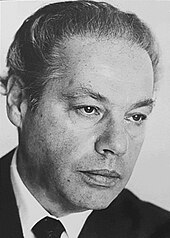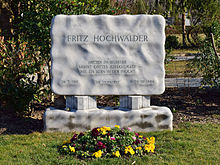Fritz Hochwälder
Fritz Hochwälder (born May 28, 1911 in Vienna , Austria-Hungary ; died October 20, 1986 in Zurich ) was an Austrian playwright .
Life
Fritz Hochwälder learned the upholstery trade from his father on Westbahnstrasse in Vienna's 7th district Neubau , but pursued his historical and political education as an autodidact, for example through adult education courses at the Volksheim Ottakring , and was politically active on the side of the Socialist Workers' Youth (SAJ), the youth organization the SDAP in the district of Neubau. During this time his only lengthy prose work Thursday was created , which was only found in the estate after his death and published posthumously in 1995. It is a city novel written in the late Expressionist style, "as it has no comparison in the Austrian literature of those years" (Karl-Markus Gauss, NZZ).
Hochwälder's first tragedy, Jehr , premiered in 1932 at the Wiener Kammerspiele . In August 1938, after the annexation of Austria , he had to flee Austria as a Jew and an avowed leftist. He was able to get from Vienna undetected to Vorarlberg and from there reached Switzerland by swimming across the Rhine . There he was temporarily interned, but then made his literary hobby his main occupation, obliged by law to be inactive. Both parents were murdered in the Theresienstadt concentration camp.
Hochwälder's drama Das Heilige Experiment , a representation of the failure of the Jesuit state in Paraguay because of the secular interests of Spanish colonial rule, was premiered in 1943 at the Biel Solothurn Theater (at that time still the Biel-Solothurn City Theater ) (production: Peter Lotar ) and had its successful premiere in 1947 liberated Austria (at the Vienna Burgtheater ). In 1952 it also brought its author the international breakthrough, starting from Paris (under the title Sur la terre comme au ciel ).
Hochwälder's most successful period was the 1950s, in which he practically acted as the Burgtheater's in-house author and his dramaturgically well-built, exciting pieces with a historical and political background were also played a lot abroad. Hochwälder's work was also discovered for television. Many of his plays were adapted for the television play, which was still very much tied to the conditions of the theater, and Hochwälder also accepted orders for scripts. In the 1960s it became quieter around him. The dramatist's somewhat pathetic language, which had been trained in the classics, fell out of fashion, and Hochwälder's heart disease also impaired his creativity. But Fritz Hochwälder remained "the" official playwright of the Second Republic to the end.
He was buried in a grave of honor in the Vienna Central Cemetery (group 33 G, number 74).
Awards
- 1955 Prize of the City of Vienna for Literature
- 1956 Grillparzer Prize
- 1962 Anton Wildgans Prize
- 1966 Grand Austrian State Prize for Literature
- 1971 Austrian Cross of Honor for Science and Art
- 1972 Ring of Honor of the City of Vienna
- 1979 Franz Theodor Csokor Prize
- 1980 Austrian Decoration of Honor for Science and Art
Plays
- Year . 1932
- Love in florence . 1939
- Esther . 1940
- The sacred experiment . 1942
- Casa Speranza . 1943
- Hotel du Commerce . 1943
- The refugee . 1944/45
- The veiled woman . 1946
- Meier Helmbrecht . 1946
- The public prosecutor . 1947
- Virginia . 1948
- Donadieu . 1953
- The hostel . 1955
- The innocent . 1956
- Thursday . 1959
- Fateful comedy . 1960
- The vanished moon . 1961
- 1003 . 1964
- The raspberry picker . 1965
- The command . 1967
- Lazaretti or The Saber Tiger . 1975
Essay and lectures
- In the change of times . 1980
Film adaptations
- 1948: The woman on the way (directed by Eduard von Borsody, with Brigitte Horney, Robert Freitag).
- 1965: The raspberry picker (directed by Erich Neuberg ), with Helmuth Qualtinger , Kurt Sowinetz , Hilde Sochor , Blanche Aubry , Lukas Ammann, Helmut Janatsch , Emmerich Schrenk
- 1967: The Public Prosecutor (TV) (Director: Hans Dieter Schwarze ), with Paul Hoffmann , Klaus Schwarzkopf , Udo Vioff , Martin Lüttge , Carl Lange , Paul Dahlke
- 1967: The command (TV) (directors: Erich Neuberg, Edwin Zbonek, with Emil Stöhr, Franz Stoss, Kurt Sowinetz).
The 1986 film Mission (directed by Roland Joffé , with Robert De Niro , Jeremy Irons , Liam Neeson ) was originally inspired by Hochwälder's play The Holy Experiment .
literature
- Hochwälder, Fritz. In: Lexicon of German-Jewish Authors . Volume 12: Hirs – Jaco. Edited by the Bibliographia Judaica archive. Saur, Munich 2008, ISBN 978-3-598-22692-2 , pp. 122-131.
- Brigitte Marschall: Fritz Hochwälder . In: Andreas Kotte (Ed.): Theater Lexikon der Schweiz . Volume 2, Chronos, Zurich 2005, ISBN 3-0340-0715-9 , p. 855.
- Wilhelm Bortenschlager : The playwright Fritz Hochwälder. Wagner, Innsbruck 1979.
- Todd C. Hamlin: Who's Blame? - Only those who had to gas. Fritz Hochwälder and his post-war play "Holokaust". In: Jörg Thunecke (Hrsg.): Echo des Exils. The work of Austrian writers who emigrated after 1945. ARCO, Wuppertal 2006, pp. 169–1983.
- Peter Roessler: An exile drama in Austrian post-war films. From Fritz Hochwälder's “Refugee” to the film “Die Frau am Weg”. In: Claus-Dieter Korn u. a. (Ed.): Exile research. An international yearbook. Volume 21. edition text and criticism, Munich 2003, pp. 141–154.
- Peter Roessler: Fritz Hochwälder's games of guilt. A dramatist in exile in liberated Austria. In: Zwischenwelt. Journal of the Culture of Exile and Resistance. 32 vol., No. 2–3 (2015), pp. 33–38.
- Dieter Schoß: Fritz Hochwälder. In: Horst Haase (ed.): Austrian literature of the 20th century. Individual representations. Volk und Wissen publishing house, Berlin 1988, ISBN 3-06-102593-6 , pp. 480–497.
Web links
- Literature by and about Fritz Hochwälder in the catalog of the German National Library
- Fritz Hochwälder in the Internet Movie Database (English)
- Biographical article about FH by René Freund (Wiener Zeitung) ( Memento from April 19, 2005 in the Internet Archive )
- List of bequests (PDF; 290 kB), Vienna Library in the City Hall
- Fritz Hochwälder in original sound in the online archive of the Austrian Media Library (interviews, literature readings)
- In the spring of 1986 Charles Linsmayer conducted an interview with Fritz Hochwälder in which the author referred to the "Holy Experiment".
Individual evidence
- ^ ORF: Fritz Hochwälder as a contemporary historian , May 27, 2011
- ^ Sabine Prüfer: The Individual at the Crossroads. The Works of Robert Bolt, novelist, dramatist, screenwriter , Peter Lang, Frankfurt am Main 1998, p. 145.
| personal data | |
|---|---|
| SURNAME | Hochwälder, Fritz |
| BRIEF DESCRIPTION | Austrian writer |
| DATE OF BIRTH | May 28, 1911 |
| PLACE OF BIRTH | Vienna , Austria |
| DATE OF DEATH | October 20, 1986 |
| Place of death | Zurich , Switzerland |

